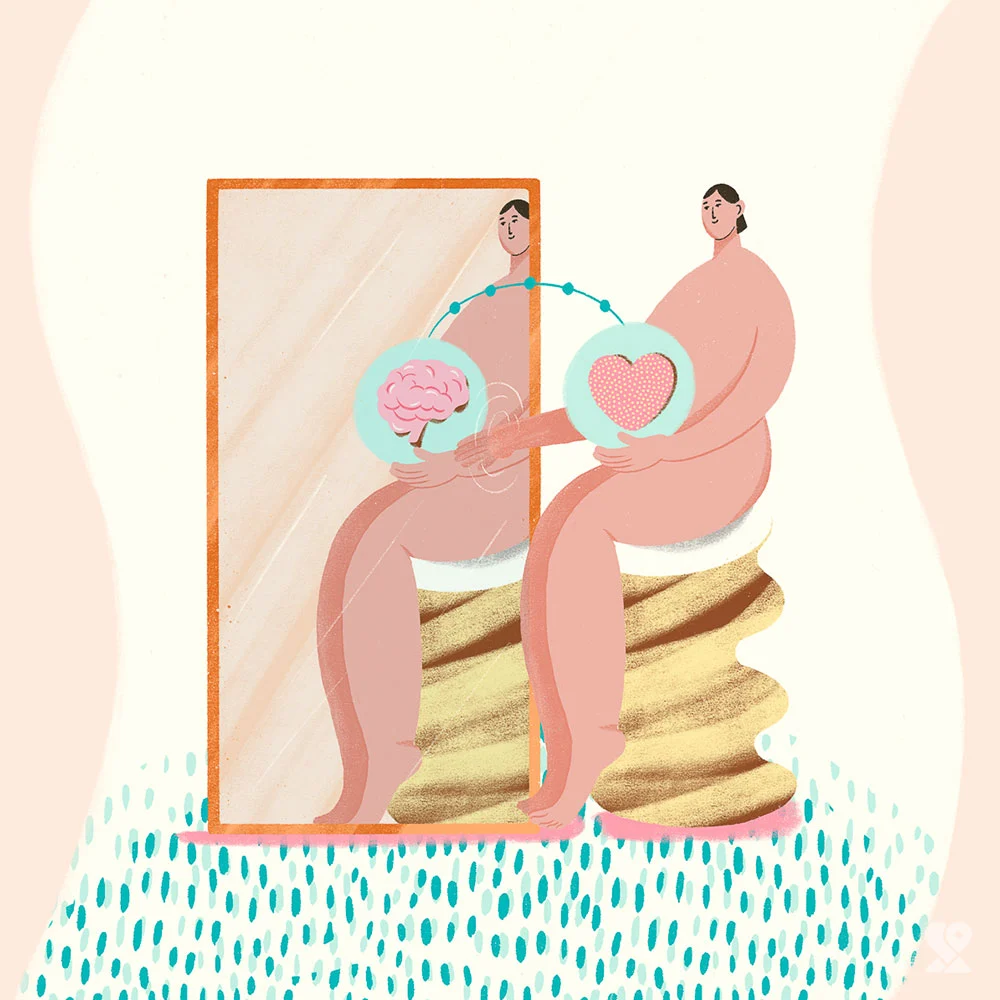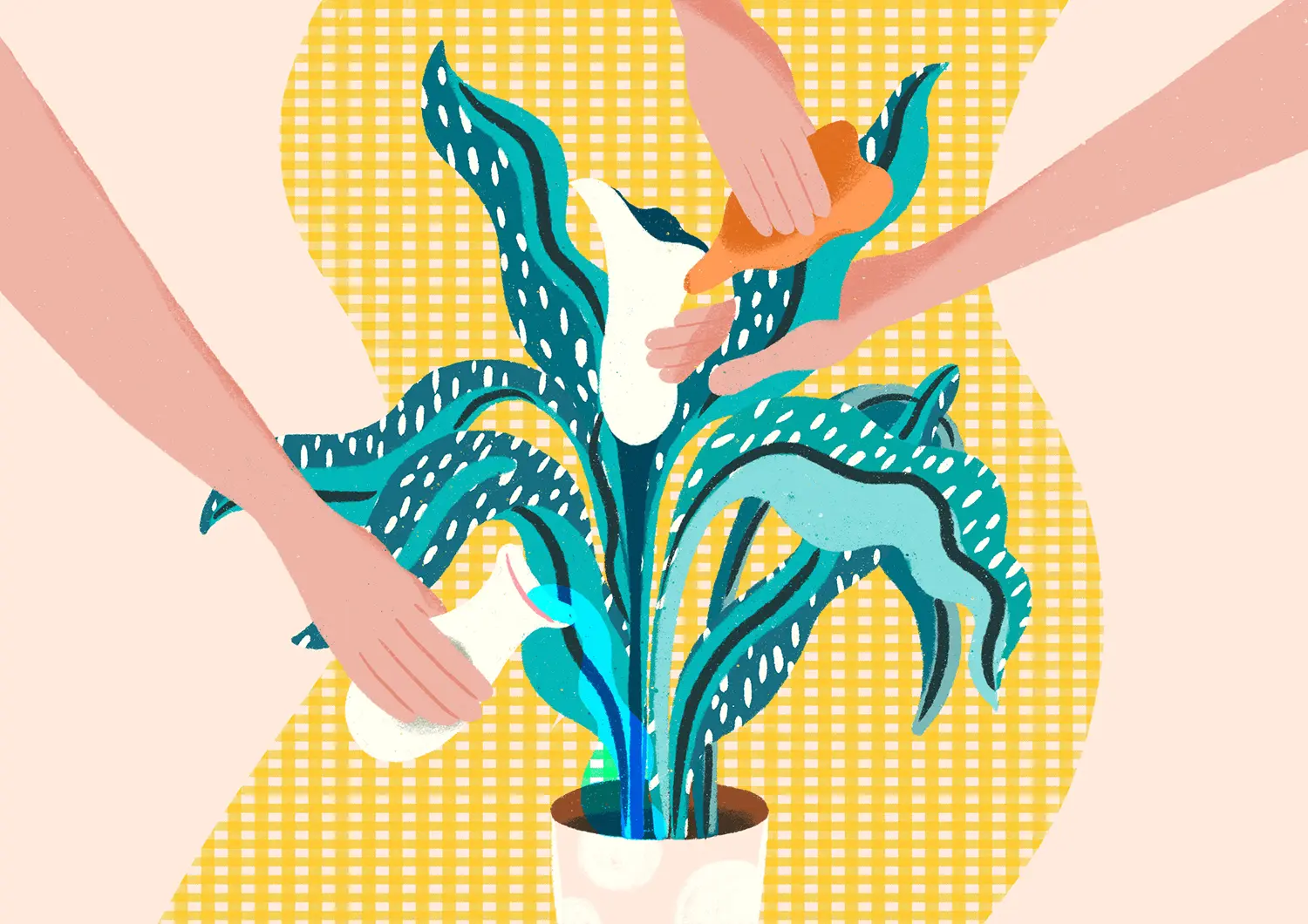We grieve at times and dance at others; we search for meaning yet often feel lost. Each of us encounters moments of chaos, disappointment, and the sense that life has not unfolded as we wished. However, scientific research reveals that our self-perceptions may not accurately reflect how others truly see us. This perceptual bias gives rise to a psychological phenomenon known as the "Beautiful Mess Effect".

The Beautiful Mess Effect
Have you ever noticed a wall completely covered in climbing plants? As they grow, these plants quietly spread across the surface, appearing chaotic at first glance. Yet, over time, they become dense, transforming the entire wall into a unique spectacle of beauty and disorder.
In psychology, there exists a phenomenon known as the "Beautiful Mess Effect". This term refers to the tendency of individuals to perceive their own vulnerabilities more negatively than others do. For example, when taking responsibility for a mistake, one might believe that others solely see their shortcomings and flaws - when, in fact, those observers may admire their courage to take responsibility. Similarly, when asking for help, one might fear that others will question their abilities, while those individuals may simply find the request reasonable. Research indicates that we often exaggerate the negative evaluations we believe others hold; moreover, our thoughts typically do not reflect how people truly perceive us during difficult times.
This tendency is quite common. Psychologists suggest that it likely arises from our focus on the details that evoke embarrassment or shame, while others tend to see the bigger picture.

What unfolds when our thoughts stray from reality? When we magnify others' negative judgments in our minds, we may fear revealing our vulnerabilities, concealing our true feelings and needs. Yet, in a nurturing and safe environment, allowing ourselves to show our tender side to empathetic companions can yield profound rewards in our relationships.
Research reveals that sharing our personal stories can deepen the bonds of intimacy and trust between individuals. A heartfelt apology carries the power to mend fractured connections. Engaging in sincere communication and daring to let others glimpse our vulnerabilities can leave a lasting, positive impression. For to show vulnerability is to embrace our humanity and authenticity. Though it may stir feelings of embarrassment, shyness, or guilt, it also signifies a courageous willingness to be seen in our entirety, even the less flattering parts.
“ We love seeing raw truth and openness in other people,
but we are afraid to let them see it in us. ”
- Brené Brown

Healing Begins with Kindness to Oneself
The "Beautiful Mess Effect" acts like a negative filter, shaping our perceptions of ourselves and our surroundings. Research indicates that those who practice higher levels of self-compassion are less critical of their own vulnerabilities.
Self-compassion helps us discover beauty amidst imperfection, allowing us to return to our true selves and delve into our inner world. It is through exploration and self-discovery that we cultivate a deeper, more compassionate relationship with ourselves.
A person's level of self-compassion hinges on their attitude and approach toward themselves. Scholars have conceptualized "self-compassion" as comprising two main core elements: self-warmth and self-coldness.
Self-warmth represents a positive attitude and approach toward oneself. It encompasses self-kindness, common humanity, and mindfulness:
- Self-kindness: This means responding to pain, failure, and feelings of inadequacy with warmth and understanding, rather than ignoring them or resorting to self-criticism. Imagine how you would support a close friend navigating through their own struggles and failures. Now, try to extend that same care and understanding to yourself.
- Common humanity: Recognizing that pain, struggle, inadequacy, and failure are universal experiences - part of the shared human condition. We are all fragile and imperfect, each facing our own challenges. Remember, you are not alone in this journey.
- Mindfulness: Maintaining a clear awareness of the present moment, acknowledging your difficulties without ignoring them or exaggerating their severity.
Self-coldness stands in stark contrast to self-warmth, representing a negative attitude and approach toward oneself. It includes self-judgment, isolation, and over-identification:
- Self-judgment: When faced with pain, failure, and feelings of inadequacy, this involves viewing oneself through a lens of criticism and scrutiny.
- Isolation: In moments of struggle, one may feel trapped in a sense of helplessness, believing that others cannot understand their plight. For instance, one might think that everyone else handles challenges better than they do.
- Over-identification: This occurs when one becomes excessively absorbed in negative emotions and thoughts, making it difficult to view one’s situation objectively.
Self-coldness arises from our threat-defense system, originally designed to shield us from external threats. However, in the face of setbacks, we may unconsciously respond to ourselves with criticism and indifference, developing a hostile relationship with our own selves. In contrast, self-warmth emerges from our safeness system, which fosters a sense of calm and relaxation, allowing us to engage in activities that promote our mental well-being, such as self-affirmation and nurturing relationships that provide a sense of security.

Daily Practice of Self-Compassion
Self-compassion is not something everyone inherently understands; it requires practice and cultivation. Remember, you are worthy of love and care; emotions are natural feelings that arise without judgment of right or wrong. We can nurture the healing power of self-compassion through various methods:
- Ask yourself, what am I experiencing in this moment? Tune into your emotions, thoughts, and physical sensations.
- Remind yourself that suffering is a shared human experience.
- What does your present self need? How can you offer the care that you require in this moment?
There are many methods for practicing self-compassion, such as:
- Loving Kindness for Self: When we become accustomed to self-criticism and harsh self-discipline, it is essential to offer ourselves words of care and blessing, infusing our hearts with strength. Sometimes, you might feel unsure about how to bless yourself. In such moments, we can engage in kindness practice, extending genuine wishes to different people and to ourselves, cultivating a sense of inner peace and tranquility.
- Loving Kindness Meditation: Send loving-kindness to various recipients, such as casual acquaintances, those we may not particularly like, and even to all beings in the universe. By nurturing the seeds of kindness bit by bit, we learn to treat others and ourselves with compassion.
- Writing a Letter to Yourself: Support yourself through a letter, understanding your needs and concerns. Reflect on your progress and strengths, allowing yourself to view challenges from a different perspective.
- Self-Appreciation Practice: At times, we may find it uncomfortable, even resist praising ourselves. Yet, recognizing and acknowledging our beautiful qualities is an essential part of the journey toward self-acceptance.
On the TourHeart+ platform, you can explore the practices outlined above, as well as an extensive selection of related audio and written exercises. Here, you can cultivate a perspective of acceptance, gaining valuable insights into your strengths and areas for growth. Take the time to reflect on how others navigate similar experiences, enabling you to embrace your own vulnerabilities with greater openness.
Remember, at any moment, you always have the potential to be your own most compassionate ally.
References:
Brenner, R. E., Heath, P. J., Vogel, D. L., & Credé, M. (2017). Two is more valid than one: Examining the factor structure of the Self-Compassion Scale (SCS). Journal of counseling psychology, 64(6), 696–707. https://doi.org/10.1037/cou0000211
Brenner, R. E., Vogel, D. L., Lannin, D. G., Engel, K. E., Seidman, A. J., & Heath, P. J. (2018). Do self-compassion and self-coldness distinctly relate to distress and well-being? A theoretical model of self-relating. Journal of counseling psychology, 65(3), 346–357. https://doi.org/10.1037/cou0000257
Ferrari, M., Ciarrochi, J., Yap, K., Sahdra, B., & Hayes, S. C. (2022). Embracing the complexity of our inner worlds: Understanding the dynamics of self-compassion and self-criticism. Mindfulness, 13(7), 1652–1661. https://doi.org/10.1007/s12671-022-01897-5
The British Psychological Society. (2024). The beautiful mess effect. Retrieved from https://www.bps.org.uk/psychologist/beautiful-mess-effect
Anna Bruk. (2021). Other People Don’t Think You’re a Mess. Scientific American. Retrieved from https://www.scientificamerican.com/article/other-people-dont-think-youre-a-mess/
Kardas, M., Kumar, A., & Epley, N. (2022). Overly shallow?: Miscalibrated expectations create a barrier to deeper conversation. Journal of Personality and Social Psychology, 122(3), 367–398. https://doi.org/10.1037/pspa0000281
Savitsky, K., Epley, N., & Gilovich, T. (2001). Do others judge us as harshly as we think? Overestimating the impact of our failures, shortcomings, and mishaps. Journal of personality and social psychology, 81(1), 44–56. https://doi.org/10.1037//0022-3514.81.1.44
Bachman, G. F., & Guerrero, L. K. (2006). Fogiveness, Apology, and Communicative Responses to Hurtful Events. Communication Reports, 19(1-2), 45–56. https://doi.org/10.1080/08934210600586357



